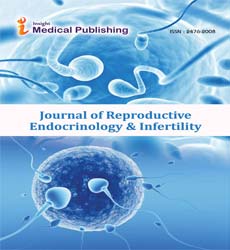What do reproductive endocrinologists do?
Jeffrey F. Peipert MD, PhD
Jeffrey F. Peipert*
Department of Obstetrics and Gynecology, Indiana University School of Medicine, Indianapolis, Indiana
- *Corresponding Author:
- Jeffrey F. Peipert
Department of Obstetrics and Gynecology, Indiana University School of Medicine, Indianapolis, Indiana
E-mail: jpeipert@iu.edu
Received Date: November 11, 2021; Accepted Date: November 19, 2021; Published Date:November 29, 2021
Citation: Peipert JF (2021) What do reproductive endocrinologists do? J Rep Endo Infert. Vol.6 No.6: 34.
Commentary
Reproductive endocrinologists, or REs, are fertility/infertility specialists. They are the sole doctors trained in providing fertility treatments using assisted reproductive technologies (ART) like in vitro fertilization (IVF) and egg freezing. REs also are trained in obstetrics and gynecology, then have additional training to supply fertility treatment (more thereon later). REs diagnose and comprehensively treat infertility, polycystic ovary syndrome (PCOS), or abnormalities of the genital system, and perform fertility preservation procedures like egg freezing.
REs have a radical knowledge of the anatomy and performance of the feminine genital system and endocrine (hormone) system, and knowledge of the male systems, as well. For example, within the case of a few trying to conceive during which the male partner features a low sperm count, a reproductive endocrinologist may recommend intrauterine insemination or in vitro fertilization, which may improve chances of fertilization.
Reproductive endocrinologists are the sole doctors qualified to supply egg freezing, perform egg retrievals, or treat complex cases of infertility.
Essentially, the amount and type of education. OB/GYNs undergo school of medicine, then a residency in obstetrics and gynecology. After that, to become an RE, a doctor must do three years of additional training to practice fertility medicine. This period is named a fellowship in reproductive endocrinology and fertility, which focuses on providing fertility treatment and performing research within the field. All told, it’s about 11 years of postgraduate schooling. Additionally, while OB/GYNs take one board exam, REs take two—one for obstetrics and gynecology, and another for reproductive endocrinology and infertility.
While OB/GYNs are typically exposed to some fertility medicine as a part of their residency training, their expertise can’t compare thereto of an RE. And, in contrast, while all REs undergo OB/ GYN residency, most of them don’t regularly deliver babies and wouldn’t consider that a specialty. Women who get pregnant through assisted reproductive technology (ART) with an RE are usually discharged to their OB/GYN after their pregnancy is deemed healthy and stable.
An endocrinologist may be a physician specialist that manages conditions of the endocrine glands, which regulate the assembly of hormones in our bodies. While there's some overlap with the RE specialty (as hormones are intimately involved within the reproduction process), endocrinologists start their training in general medicine , not obstetrics and gynecology-so they don’t have the expertise within the female genital system that an RE has. Endocrinologists commonly diagnose and treat diabetes, growth disorders, hypo- and hyperthyroidism, and more.
For women with endocrine disorders, like hypothyroidism, who try to conceive, their RE will often add tandem with their endocrinologist to manage their care.
There are a couple of cases during which you'd want to ascertain a reproductive endocrinologist. First, there’s the case of fertility preservation, like egg or embryo freezing. Women or couples might want to undergo fertility preservation to offer them a far better chance of conceiving later, or because they're close to undergo a procedure, like cancer treatment, that could impact their fertility. While this might or might not be wiped out the context of an infertility diagnosis, it’s still a fertility procedure that needs a reproductive endocrinologist.
Secondly, you'd want to ascertain an RE if you’ve been trying to urge or stay pregnant for a year (or for 6 months, if you’re over 35). This is the medical definition of infertility. Being diagnosed as infertile doesn’t mean you can’t get pregnant ever-it just means something is preventing your body from getting pregnant on its own, which is where a reproductive endocrinologist can help. (We offer comprehensive infertility treatment at our sister practice Expect Fertility.)
Open Access Journals
- Aquaculture & Veterinary Science
- Chemistry & Chemical Sciences
- Clinical Sciences
- Engineering
- General Science
- Genetics & Molecular Biology
- Health Care & Nursing
- Immunology & Microbiology
- Materials Science
- Mathematics & Physics
- Medical Sciences
- Neurology & Psychiatry
- Oncology & Cancer Science
- Pharmaceutical Sciences
